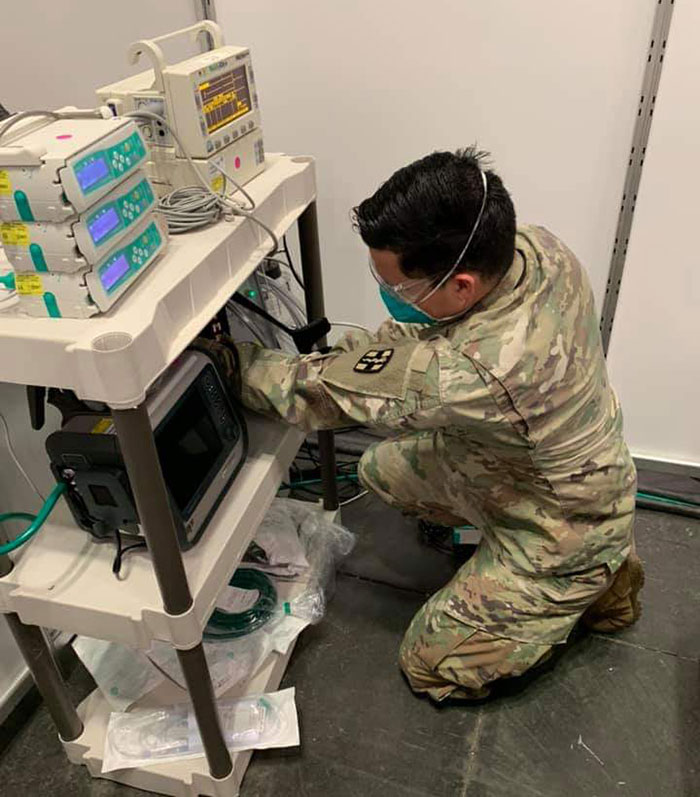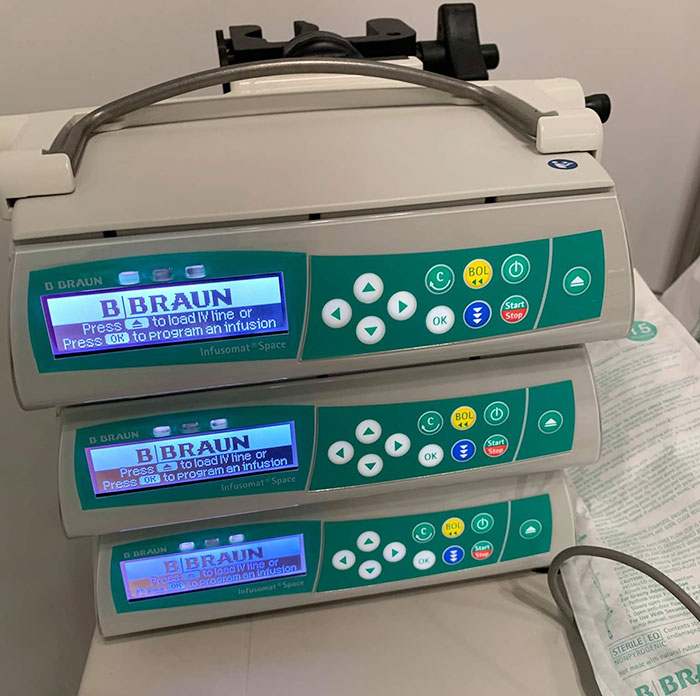Army Addresses Critical Shortage of Infusion Pumps and Ultrasonic Cleaners

The U.S. Army Medical Materiel Development Activity's Warfighter Deployed Medical Systems Project Management Office rallied to address critical shortages of infusion pumps and ultrasonic cleaners, a necessity in the U.S. Army's response to provide urgent, lifesaving solutions in the battle against COVID-19. Together with the U.S. Army Medical Research Acquisition Activity the WDMS PMO's Medical Modernization Product Management Office awarded multiple contracts to procure lifesaving devices in an unprecedented timeframe of only three weeks.
On March 20, the Modernization team received notice of critical shortages of infusion pumps and ultrasonic cleaners. Within eight days, the group was able to leverage and maximize existing contracts put in place over the last six months for both infusion pumps and ultrasonic cleaners. Additionally, within 15 days of the initial notification, multimillion dollar contracts were awarded for additional devices needed for the urgent COVID-19 response.
The procurement efforts required the team to obtain appropriate funding, conduct market research and evaluation, and validate requirements and essential characteristics. Medical Modernization also coordinated with vendors to develop comprehensive equipment kits, and produced operation and maintenance plans, start-up lists and entered into the supply chain logistics involved throughout the process.
"As the medical units were preparing to deploy to support the nation's response to COVID-19, they identified critical equipment items," said Army Col. Gina Adam, USAMMDA commander. "Our teams worked quickly to identify solutions and ensure they would be sent where needed." Army Maj. Janessa Moyer is the product manager for Medical Modernization, and she is in charge of the team's response to the nation's COVID-19 effort.
"The response to COVID-19 has been a collaborative one involving multiple stakeholders, prioritizing medical equipment and capabilities based on the mission requirement," said Moyer. "Our team has really leaned forward, ensuring that critical equipping shortages are resolved and units have their full complement of equipment in order to carry out the mission."
USAMRAA's dedication and timely assistance with these contracts greatly enhanced the Modernization team's response.

Infusion Pumps
Intravenous infusion pumps have a critical role in the nationwide effort to combat COVID-19 by administering therapeutic fluids necessary for effective treatment while allowing medical professionals to closely monitor patients' recovery. The infusion pumps deliver precise quantities of life-saving fluids, nutrients and medications to a patient's circulatory system. This infusion pump achieves its purpose while incorporating a fully integrated electronic system that delivers real-time data reporting and automatic notifications, thus minimizing infusion-related medication errors.
The multi-channel pumps are no longer manufactured, and therefore cannot be purchased. The Modernization team conducted market research and developed an interim solution utilizing existing single-channel B.Braun infusion pumps used by U.S. Transportation Command, and it developed a "daisy chain" configuration, allowing three separate single-channel pumps into one kit in order to meet the capability gap. The current contract was executed and a new contract for an additional 5,200 Infusion Pump Kits was awarded on April 17, to enable the Army to rapidly deploy as needed for the COVID-19 pandemic response.
Ultrasonic Cleaners
The importance of sterile instruments in treating highly infectious diseases cannot be overstated. The ultrasonic cleaners play an integral role in providing COVID-19 patients with the highest level of care.
Ultrasonic cleaners produce ultra-high frequency sound waves through a tank to remove biological debris and contaminants from surgical instruments and other equipment. The device is designed to be highly mobile and operate independently of fixed plumbing, making it expedient for use in the Army Hospital Center elements conducting medical operations in New York City. Ultrasonic cleaners provide medical professionals with a safer and more efficient alternative to hand-washing equipment, drastically reducing the risk of contamination.
Ultrasonic cleaners in the Army's sets, kits, and outfits are no longer manufactured, and therefore were unable to be purchased. The Modernization team identified and selected the next-generation device. The current contract was executed and another contract for an additional 250 ultrasonic cleaners was awarded on April 8, enabling the Army to rapidly deploy as needed for the COVID-19 response.
Together with the WDMS PMO, Medical Devices Assemblage Management Product Management Office and USAMRAA, the Modernization team swiftly met the high demand of medical devices imposed by the COVID-19 pandemic. The group embraced its mission to meet required medical capabilities through continuous analysis, testing and acquisition of modernized medical materiel in support of the Warfighter during the most urgent medical demands within the United States.
USAMMDA is a subordinate command of the U.S. Army Medical Research and Development Command. USAMRDC is leading research efforts to prevent, detect and treat COVID-19. USAMMDA is applying existing field-leading research capabilities, a global research network, and established partnerships with industry and academia to support the whole-of-government response to COVID-19.













